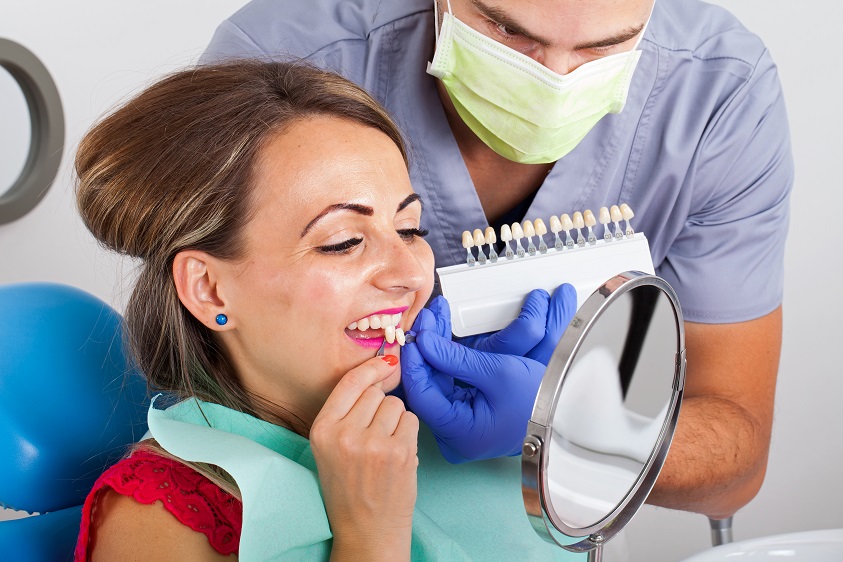Restorative dentistry repairs or replaces teeth to restore function, appearance, and oral health. Usually, the affected teeth are damaged, decayed, or missing, and restored using treatments like crowns.
If you’re dealing with visibly damaged or missing teeth, restorative dentistry in New Jersey can bring back your comfort, function, and confidence. Dentists across the state are using modern technology and minimally invasive approaches to restore your smile.
What Is Restorative Dentistry?
Restorative dentistry uses direct treatments like fillings and indirect solutions like crowns, bridges, and implants for natural-looking results.
The focus is on fixing damaged teeth, and replacing missing ones. This restores your mouth’s natural function and appearance.
Key treatment approaches include:
- Direct restorations like fillings
- Indirect solutions like crowns, bridges, and implants
- Digital impressions and same-day crowns
- Gentle alternatives like ART for drill-free treatment
Many NJ dental offices combine advanced technology with patient-centered care. That means offering digital impressions, same-day crowns, and gentle alternatives like ART.
What Dental Problems Can Restorative Dentistry Fix?
Restorative dentistry uses fillings, crowns, implants, bridges, and advanced restoration techniques to address issues including:
- Cavities and tooth decay
- Cracked or fractured teeth
- Missing teeth
- Worn-down teeth
- Failing or outdated dental work
Have you noticed pain while chewing, increased sensitivity, or changes in your bite? These are all problems that procedures like fillings, crowns, implants, or Atraumatic Restorative Treatment (ART) can fix. Let’s explore how dentists treat these problems and what signs to watch for.
Tooth Decay and Cavities
Cavities are treated with composite fillings that match natural teeth. ART techniques using hand tools and fluoride-releasing materials without drills or needles can also be used.
Tooth decay is one of the most common dental problems. If your tooth feels sensitive when you eat sweets or drink cold water, decay may be forming beneath the surface. It can deepen and lead to pain or infection if left untreated.
Treatment options include:
- Composite fillings that match natural tooth color
- ART for comfortable, drill-free treatment
- Advanced techniques for patients with dental anxiety
- Fluoride-releasing materials for added protection
Addressing cavities early prevents more serious procedures and preserves healthy tooth structure.
Cracked or Fractured Teeth
Cracked teeth are repaired with dental bonding for small cracks, veneers for surface damage, or crowns for severe fractures. Same-day CAD/CAM technology is often used in these treatments.
Cracks can occur due to grinding, chewing on hard foods, or trauma. If you feel sharp, fleeting pain when biting down, you could have a hidden fracture. These fractures often go unnoticed until they worsen, so early diagnosis is important.
Treatment options based on severity:
- Dental bonding for small surface cracks
- Veneers for front tooth cosmetic repairs
- Full crowns to stabilize damaged teeth
- Same-day crown placement using CAD/CAM technology
Your dentist may recommend bonding for small cracks or a full crown to stabilize the tooth, depending on the severity of the cracks. Many New Jersey practices offer same-day crown placement.
Early restoration prevents further cracking and can help avoid the need for extraction or root canal treatment.
Missing Teeth
Missing teeth are replaced with dental implants for permanent solutions, fixed bridges attached to neighboring teeth, or removable dentures.
Tooth loss can affect your ability to eat, speak, and smile. If you find yourself chewing on one side or hiding your smile, a missing tooth may be affecting your oral health more than you realize.
Replacement options include:
- Dental implants for permanent, natural-looking results
- Fixed bridges that attach to neighboring teeth
- Partial dentures for many missing teeth
- Full dentures for complete tooth replacement
Replacing missing teeth restores your bite and helps preserve jawbone and facial structure.
Worn-Down Teeth
Worn teeth are restored with custom overlays, crowns, or full-mouth rehabilitation plans. Night guards might also be used to prevent future grinding damage.
Over time, habits like teeth grinding (bruxism), acid reflux, or diet-related erosion can wear away enamel. If your teeth appear shorter, feel rough, or you often wake up with jaw soreness, excessive wear may be to blame.
Treatment approaches include:
- Custom crowns for individual worn teeth
- Overlays for partial tooth coverage
- Full-mouth rehabilitation for extensive wear
- Night guards to prevent future damage
Restoring worn teeth improves bite alignment and comfort while protecting long-term oral function.
Failing or Outdated Restorations
Old fillings or crowns should be replaced when they crack, loosen, or fail, using modern materials like composite resin and porcelain for better durability.
Restorations like amalgam fillings or aging crowns can degrade over time. If food frequently gets stuck in the same spot or an old filling feels unstable, it might need an update.
Signs you need replacement:
- Food getting stuck in the same spot repeatedly
- Old filling feels loose or unstable
- Visible cracks or wear in existing work
- Pain or sensitivity around old restorations
Modern materials like composite resin and porcelain offer improved durability, appearance, and comfort. In New Jersey, many dentists also provide digital imaging and precise milling for better-fitting restorations.
Updating failing dental work enhances comfort and prevents future complications.
How ART (Atraumatic Restorative Treatment) Supports Modern Dental Care
What is ART dental treatment?
ART treats cavities using hand tools and glass-ionomer cement without drills or needles. It’s a minimally invasive technique ideal for children, seniors, and patients with dental anxiety.
ART doesn’t need electricity, making it a great option for mobile care or community outreach clinics in New Jersey.
ART benefits include:
- No drills or needles required
- Perfect for patients with dental anxiety
- Suitable for children and seniors
- Available in mobile dental settings
For patients who prefer gentle, conservative care, or those without easy access to traditional dental settings, ART provides an effective, low-stress alternative.
ART expands access to restorative care and offers a comfortable option for patients with anxiety or special needs.
What Are the Benefits of Restorative Dentistry for New Jersey Patients?
Restorative dentistry improves chewing ability, relieves pain, reduces infection risk, enhances appearance, and preserves bone structure.
Whether you’re restoring one tooth or rebuilding your entire bite, the benefits are more than just aesthetic:
- Improved ability to chew and speak
- Relief from dental pain or sensitivity
- Reduced risk of infection and tooth loss
- Enhanced confidence and appearance
- Preservation of bone and facial structure
Restorative dentistry improves both function and quality of life, regardless of age or dental history.
How Do I Know Which Restorative Option Is Right for Me?
The right treatment depends on the extent of damage, your oral health goals, and your comfort level. These things can be determined via examination and digital imaging.
If you’re experiencing sensitivity, pain, or visible damage, your dentist will examine the affected area. They may use digital imaging to guide your treatment plan. A simple filling can solve some cases, while others may call for a crown, bridge, or implant.
Factors considered include:
- Extent of damage or decay
- Your oral health goals
- Budget and insurance coverage
- Personal comfort preferences
- Long-term maintenance needs
Dentists in New Jersey work with patients to customize solutions based on budget, preferences, and long-term needs. A personalized consultation is the first step toward restoring your smile and oral health.
Restorative Dentistry in New Jersey FAQs
Is restorative dentistry covered by insurance in New Jersey?
Most dental insurance plans cover basic restorations like fillings and crowns. Implants or elective upgrades may have partial coverage. Check with your provider for details.
How long do dental restorations typically last?
Composite fillings last 5–10 years; crowns can last 10–15 years or more. Implants may last a lifetime with proper care.
Can I get ART treatment in a private dental office?
Yes. While ART is commonly offered in public clinics, some practices in New Jersey may include it for pediatric, geriatric, or anxiety-prone patients.
What dentist near me fixes cracked teeth in New Jersey?
Most general and restorative dentists in New Jersey can repair cracked teeth using bonding, veneers, or crowns. The treatment they use depends on the severity of the damage.
Is restorative dentistry painful?
Modern restorative dentistry uses local anesthesia and advanced techniques to minimize discomfort. Many procedures, including ART, are virtually painless.
Restore Your Smile with Trusted Restorative Dentistry in New Jersey
If you’re living with dental pain, missing teeth, or outdated dental work, you don’t have to settle for discomfort. Restorative dentistry in New Jersey offers advanced and minimally invasive solutions that can repair damage, improve function, and give you back your smile.
Resources:
Kikwilu, E.N., Frencken, J. & Mulder, J. Impact of Atraumatic Restorative Treatment (ART) on the treatment profile in pilot government dental clinics in Tanzania. BMC Oral Health 9, 14 (2009). https://doi.org/10.1186/1472-6831-9-14




